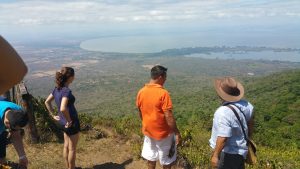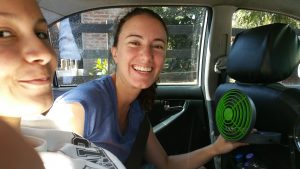


During Holy Week, the Costa Rica study abroad program took an educational trip to Nicaragua. Though the trip was technically to teach us about the realities of poverty, the impacts of historical events upon current day circumstances, different types of healthcare systems, and many other things about the unique Nicaraguan culture, it conveniently served the dual purpose of fulfilling Costa Rican immigration law, which only allows foreigners to stay in the country undocumented for up to 3 months at a time (After a week in another country, we were safe to re-enter Costa Rica for another couple months)!
To make sure we are all on the same page here, geographically, Nicaragua and Costa Rica are so close to each other on the map that they share a border (neither Costa Rica nor Nicaragua is islands, they are both small countries that make up part of Central America, connecting Columbia to Mexico). So, driving up into Nicaragua from Costa Rica only took a couple hours. The weather in Costa Rica is amazingly temperate most days– Ticos say it’s cold when it gets down to 65 and they complain of heat when we get to the upper 80s. I expected Nicaragua to be similar since it is so physically close to Costa Rica on the map.
 But Nicaragua is different. Now I have experienced heat—I was born in Arizona, have lived through a Midwest summer, and even have visited Texas during the hot month of July—but heat is different when there is no air conditioning, no ice, and no possibility of a break from the constant heat. The only moment of any day when I did not feel smothered by heat was when I was taking a cold shower (which was good because warm water was not really an option). Nicaragua has the kind of heat that makes your clothes stick to you, that makes it hard to concentrate, and that saps all of your energy. Being in the car felt like being in an oven, and opening the windows only let more warm air in. Erin, Daniella, and I, who were riding in the back seat of the car, ended up plugging in little USB powered fans into the phone charging port of the car order to survive car trips!
But Nicaragua is different. Now I have experienced heat—I was born in Arizona, have lived through a Midwest summer, and even have visited Texas during the hot month of July—but heat is different when there is no air conditioning, no ice, and no possibility of a break from the constant heat. The only moment of any day when I did not feel smothered by heat was when I was taking a cold shower (which was good because warm water was not really an option). Nicaragua has the kind of heat that makes your clothes stick to you, that makes it hard to concentrate, and that saps all of your energy. Being in the car felt like being in an oven, and opening the windows only let more warm air in. Erin, Daniella, and I, who were riding in the back seat of the car, ended up plugging in little USB powered fans into the phone charging port of the car order to survive car trips!
Knowing that us extranjeros were delicate, my Nicaraguan host family provided a fan for me. I became very attached to this fan— It is funny how valuable something so simple can be when it is all you have. My first host family was a middle class, typical family in Managua. It consisted of about 11 people living in one (relatively) big house. There was one shower and one toilet, both in the backyard. I didn’t mind using them, though I haveto say, there is a special trick to being able to put on new clothes while in the shower, with sandals on, in the dark, without dropping all of your stuff or old clothes in the soaking wet. They fed me gallo pinto most meals, a simple mix of rice and beans and a staple for poor families in Latin America. But often, wanting to make something special for me, they were nice enough to make me fruit juice from purified water, since I couldn’t drink the ordinary water which often harbors bacteria or even parasites.
After only a couple of days, the people of my host family were talking about me as part of the family, and I was amazed how fast these people had accepted and decided to love me. The mama of the house, a delightful older lady who loves to tell stories, wanted to share everything she had with me. She even paid a motorcycle-taxi to take us to the house one night, just so I could have the experience of riding in one (which was very exciting by the way). The little girls of the house did my hair, gave me stickers, played games with me, and one even translated my homework for me! The stories go on. From these people, I learned about the openness, kindness, and willingness of the Nicaraguan people to share their lives, their limited resources, to teach what they know, and to welcome you into their midst.
More than learning about generous hospitality, I also learned some practical skills as we traveled in Nicaragua. I learned to wash clothes by hand and hang them up in the courtyard to dry overnight. I also learned to play “duck duck goose” in Spanish. Some ladies taught our whole group how to handmake corn tortillas, laughing at our weak hands which get burnt so easily, and explaining how some days they make over a hundred of these tortillas. We also learned to make some traditional Pascua (Easter) deserts. When it came to the farm, we learned how to milk a cow with your bare hands and how to catch a baby chicken (tip: you get a local kid to do it).
Of all these things that I learned, the most impactful experience was in rural Nicaragua, a small town called El Bonete. The people in this town were severely impoverished and had little access to resources. It was explained to me that the only way to have a real house is to have a family member in the States. Despite the fact that every adult in the village had at least one school degree, and many had two or three, they were all struggling hard and fighting to get by. Recently, this has become a fight against their very environment, as each year it gets hotter and the rain starts later. Most of the livelihood of this community comes from agriculture or livestock, and those things directly depend on the environment. As I looked at each dusty, brown field where herds of emaciated cows tried to find shelter from the sun in the scant shade of a couple trees, I wasn’t sure who was going to win this fight. The change in the environment for these farmers has been partially due to the deforestation of Nicaragua. Most Nicaraguans still cook with wood rather than electric or gas stoves, and as the land is deforested it gets hotter and has worse soil. But additionally, Nicaragua has the severe misfortune of being geographically situated where climate change has great effects. “Our children don’t know what it was like before, they only know what it is like to grow up in this heat,” said one mother. “Go back, and tell the United-Statesians, how we are suffering from the heat,” said the Pastor of the town. As we drove out of El Bonete, seeing the heat waves radiating off of the road in front of us, we noticed on the side of the road a bony, white horse laying in the dead grass, unmoving.